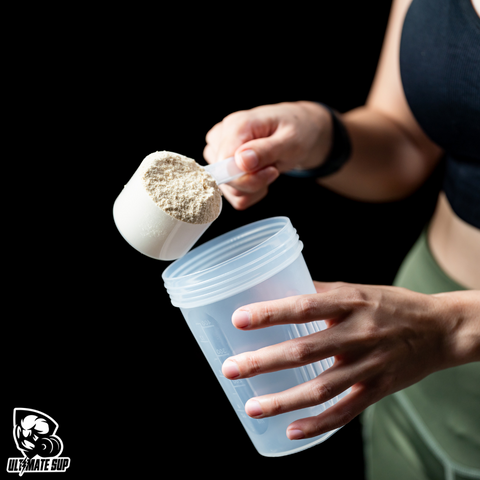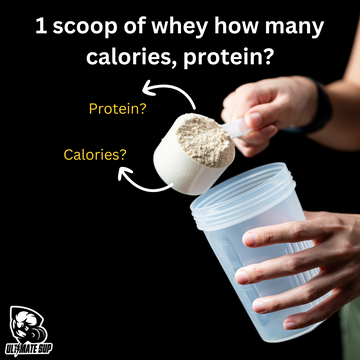Whey protein is a common supplement used by athletes. It is important to consider the serving size, calorie content, and protein and other nutrient content when selecting a whey protein product. These factors can impact muscle growth and development during exercise and nutrition. It is also important to choose a high-quality product made with pure ingredients and an adequate amount of protein per serving.
Table Of Contents
TL;DR - 1 Scoop of Whey Protein: How Many Calories and Protein Does it Contain?
One scoop of whey protein powder typically contains around 120-150 calories and 20 grams of protein. It is important to consider the serving size, calorie content, and protein and other nutrient content when selecting a whey protein product to support muscle growth and development during exercise and nutrition. It is also important to choose a high-quality product made with pure ingredients.
How many calories in 1 scoop of whey?
With the question of how many calories are in 1 scoop of whey, first, you need to know how many grams are in 1 tablespoon of whey. Because each manufacturer will specify the weight of each individual scoop of whey.
Normally, 1 scoop of whey will have a mass of 27 - 36g, a single scoop of whey protein powder can contain anywhere from 100 to 150 calories.

1 scoop of whey can provide 100 - 150 calories
However, some products may have more or fewer calories per scoop. It is always a good idea to refer to the nutritional information provided by the manufacturer or listed on the product packaging to determine the exact number of calories in a serving of a specific protein powder product.
The type of liquid you mix with your protein powder can definitely affect the calorie content of the finished product. Using water will generally result in a lower calorie product, while using milk or adding other high calorie ingredients such as nut butters or fruit can increase the calorie content.
It is also worth noting that some protein powders are formulated with added sweeteners or flavorings that can increase the calorie content. If you are trying to reduce your calorie intake, it is a good idea to choose a protein powder that is unsweetened or has a minimal amount of added ingredients.
How much protein in 1 scoop of whey?
Along with the question of how many calories are in 1 scoop of whey, many people often wonder whether 1 scoop of whey has enough protein to meet the needs of muscle growth or not?

How much protein in 1 scoop of whey?
Normally, 1 scoop of whey 27 - 36g will provide about 15-30g of protein. Similar to calories, this protein content is only a relative number. It will largely depend on the formulation of the different types of whey. But usually not too much difference.
Besides paying attention to the content, you should pay attention to what source of whey protein is used. Because this is what determines the speed and ability to absorb protein into the muscles.
Nutritional value of whey protein
Whey protein is a high-quality, complete protein that is derived from milk. It is a rich source of essential amino acids, which are the building blocks of proteins that our bodies cannot produce on their own and must be obtained from the diet.
One scoop of whey protein powder (around 30 grams) typically contains the following nutrients:
- Calories: 100-150
- Protein: 25-30 grams
- Total fat: 1-3 grams
- Total carbohydrate: 3-5 grams
- Dietary fiber: 0-1 gram
- Sugar: 1-3 grams
- Sodium: 50-100 milligrams
In addition to protein, whey protein can also be a good source of other nutrients such as calcium, phosphorus, and various B-vitamins. Some whey protein powders may also be fortified with other nutrients such as vitamins and minerals. It is always a good idea to refer to the nutritional information provided by the manufacturer or listed on the product packaging to determine the specific nutrient content of a particular protein powder product.
How to use whey protein?
Whey protein is so popular, but not everyone knows how to use this supplement properly and effectively. Here are some things you should know when you want to use whey protein:
When should and shouldn't whey protein be used?
Whey protein should be used when:
- You regularly participate in sports activities and have a need to develop muscles quickly.
- You are having a protein deficiency problem but cannot consume protein from natural foods (short-term use, low dosage).

When should and shouldn't whey protein be used?
Whey protein should not be used when:
- You are pregnant or breastfeeding.
- You are allergic or intolerant to lactose (the solution is to choose lactose-free whey products).
- You have liver and/or kidney problems (consult your doctor before use).
Reasonable dosage of whey
Eating too much protein can cause many health-related consequences. Therefore, you should only use 1-2 scoops/time. It is best to follow the manufacturer's instructions.
When to use whey protein?
These are all common times when people may choose to use whey protein. Here is a bit more information about each of these times:
- Morning when you just woke up and haven't had breakfast: Consuming protein first thing in the morning can help kickstart muscle protein synthesis and provide fuel for the day ahead. Some people find that using a scoop of protein powder in a shake or smoothie is an easy and convenient way to get protein first thing in the morning.
- After finishing the training session: Consuming protein after a workout can help support muscle recovery and repair. Some research suggests that consuming protein within 30 minutes of finishing a workout can be particularly effective at promoting muscle protein synthesis.
- 30 - 45 minutes before the training session as a snack: Consuming protein before a workout can help provide energy and nutrition to help fuel your workout. Some people find that using a scoop of protein powder in a shake or smoothie is a convenient and easy way to get protein before a workout.
Suggest some popular whey proteins today
If you are confused in choosing whey protein, here are some suggestions you can refer to:
- Gold Standard 100% Whey - ON
- NitroTech - MuscleTech
- ISO 100 - Dymatize
- ISO HD - BPI Sport
- HydroWhey - ON
- Iso Surge - Mutant
Conclusion
Incorporating whey protein into your diet can be a game-changer for achieving your fitness goals, provided you choose a product that aligns with your nutritional needs and workout schedule. Paying attention to the serving size, calorie content, and protein amount, as well as the quality of ingredients, ensures that you get the most out of your whey protein supplement. Whether you're an athlete looking to optimize muscle repair and growth or someone interested in maintaining a balanced diet, whey protein can be a valuable addition to your nutrition plan.
Related Articles:
- Top 5 - Whey Protein milk for women to gain weight gain muscle and lose fat (2024)
- Singapore whey protein - whey protein may account for many of the health benefits.
- Whey protein - Should individuals under the age of 18 take whey protein to build muscle?
- How Many Scoops Of Mass Gainer Per Day Should You Use?










